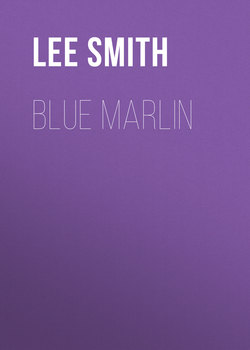Читать книгу Blue Marlin - Lee Smith - Страница 11
На сайте Литреса книга снята с продажи.
ОглавлениеINEVER RODE MY bike to Carroll Byrd’s house again. But the horrible thing was that I didn’t really blame Daddy. I could see why he would love her. For in a sense, Daddy was like her: a loner, an observer, an outsider … despite the fact that he’d been born and brought up in Lewisville, despite the fact that he was doing exactly what he was supposed to be doing and had been at it for decades.
Daddy had run the mill, Dale Industries, since he was only twenty-eight years old, when his own father killed himself.
One day I asked Daddy to tell me about this. We were down at the mill, in the very office where my grandfather had done it. It was after hours, and Daddy was trying to finish up some paperwork, at the same desk where his father had kept the gun in the bottom drawer. “Why?” I kept asking. “Why did Granddaddy shoot himself?”
But all Daddy would say was, “Oh, Jenny, there are pressures, circumstances, that you can’t possibly understand at your age”—the kind of response that infuriated me. I went right out in front of the mill and broke the aerial off Daddy’s car, then lied about it. I said it had been done by some kids in a blue van with Ohio tags. Daddy always underrated me. As a future novelist and student of the human soul, I knew a lot more than he thought I did. I was capable of understanding anything he had to tell me.
I alone understood that Daddy was a hero, a tragic figure. He stood six-foot-three and looked like Gregory Peck, with a rangy body, a prominent nose, dark thick hair, and sad gray eyes that seemed to see everything. Perhaps to make up for his father’s lapses, Daddy was the most responsible man in the world. He worked harder than anybody I have ever seen, involving himself not only in the daily business of the mill but also in the lives of the families who had been working there for generations: tirelessly attending funerals, weddings, graduations, wakes. My mother rarely went with him to these events, as she had “better things” to do, and also found “those people” depressing. Daddy served on every board in town and belonged to every organization, or so it appeared to me.
He also took care of my mean old grandmother and my shy maiden aunt Chloë, who lived with her, visiting them nearly every day. Aunt Chloë had had polio, and leaned to the left as she walked. My grandmother Ernestine Dale enjoyed absolutely nothing as far as I could see, except television; Daddy had bought them the first set in town. Grandmother claimed to watch only the quiz shows, calling them “educational,” but in fact she watched that television all the time. She had trained Aunt Chloë to hop up and turn it off the moment a visitor arrived on the porch; by the time Aunt Chloë had let the visitor into the parlor, my grandmother would be reading the Upper Room or the Bible.
Oh, she acted simpery-sweet, but she didn’t fool me for a minute—she was a fake, an old bitch. I didn’t like her and she didn’t like me much either, complaining that I was a “tomboy” and a “roughneck,” criticizing my nails, which I bit to the quick, and trying to convince me that I should like Charles Van Doren better than Elvis Presley. My grandmother was a fool! She wore big black dresses and smelled like Menthola-tum. I used to put baby powder in her tapioca and rearrange everything on her night table whenever I went to her house, so she would think she was going crazy.
I felt sorry for Daddy. He had to take care of Grandmother’s and Aunt Chloë’s affairs as well as our own; he also had to shepherd his other sister, my silly aunt Judy (that’s Judy Dale Tuttle Miller Hall), in and out of one crazy marriage after another, while back at home he had two daughters to raise and then me (the surprise). Daddy had his work cut out for him. He had a beautiful wife who required a lot of coddling and catering to, something I’d always assumed he enjoyed, but after my observations of Carroll Byrd, I realized that Mama was too soft, too sweet, too safe for Daddy, like one of those pink satin pillows on her huge unmade bed. A man could sink down in there and never get out.
Now I saw Daddy as stifled, smothered by all that pink. I saw him as a restless cowboy in Grandmother’s parlor, as a hawk among knickknacks.
No wonder he loved Carroll Byrd.
I still loved her, too; and in a way, I felt, this love brought me closer to my father, though he didn’t know it, of course. But I was trying to stop, out of loyalty to my mother and also because I knew that Carroll Byrd would never love me back. She’d never even know me. The affair would not last long—these things never did, I told myself.
Anyway, I was used to loving people who didn’t love me back. After all, I’d been in love with Tom Burlington, my sister’s husband, for years and years. Three years, to be exact, but it seemed like an eternity.
